This December, the United States Commission on International Religious Freedom (USCIRF) published its new report, Violating Rights: Enforcing the World’s Blasphemy Laws, on the implementation of blasphemy laws in nations around the world. The research and data is focused on the time period from January 2014 to December 2018 and offers insight into how, when, where, and to what extent blasphemy laws are enforced.
“Countries throughout the world have and continue to enforce criminal blasphemy laws, often justifying them as necessary to promote intergroup religious harmony. In some states, however, civilians enforce blasphemy prohibitions extrajudicially, committing acts of violence in the name of protecting God, religion, and the ‘sacred.’ Analyzing the ways in which states and private, non-state actors enforce these laws may assist the public policy community in developing clear, tailored recommendations for areas of criminal legal reform, especially in states with vague laws, harsh penalties, and high levels of enforcement.”
USCIRF in its report highlighted a few key findings. More often than not, harsh implementation of blasphemy laws occurs in nations with pre-existing religious freedom issues such as discrimination, attacks and ambushes on religious minorities and their houses of worship, and hate speech. Victims of blasphemy laws often are criminalized via related laws such as those against apostasy, “incitement to religious hatred”, and even witchcraft. And another major finding: states in which blasphemy laws exist – regardless of whether they are actively enforced by the government – often report mob violence and threats against religious minorities.
Between 2014 and 2018, some major positive and negative developments occurred simultaneously. While blasphemy laws in some nations have been abolished (i.e., Iceland, Norway, Malta, Denmark, Ireland, Canada, New Zealand, Greece, and Scotland), other nations instated or upheld new and pre-existing blasphemy laws (e.g., Kazakhstan, Nepal, Oman, Mauritania, Morocco, and Brunei). In total, based on these new statistics and findings, USCIRF identifies 84 countries with blasphemy laws.
In about half of these 84 counties (41 countries or 49%), the national blasphemy laws were enforced, and the other half (43 countries or 51%) had codified blasphemy laws, but did not enforce them. The nations that most frequently enforce these blasphemy laws include Pakistan (184 instances of enforcement), Iran (96), Russia (58), and India (51).
Out of 674 cases of criminal blasphemy enforcement, 78 incidents showed a correlation between state enforcement of blasphemy laws and mob violence, and 58 cases showed religiously-motivated mob violence in nations where blasphemy laws existed but were not actively enforced. Four nations alone (Pakistan, Bangladesh, Nigeria, and Egypt) were responsible for 80% of all cases of enforced blasphemy laws.
It is important to note that these data and statistics are conservative; according to USCIRF, “reported cases likely are an underestimate of the true number of cases of state criminal blasphemy enforcement given that many blasphemy cases go unreported in the media or are publicly reported in local news sources in languages other than those of the research team, which included English, French, Persian/Dari, Russian, and Spanish.”
In regards to who is punished under the enforcement of blasphemy laws in nations throughout the world, 18 of the 674 cases were those of religious converts. Of the cases in which the gender of the accused was revealed, 482 (84%) were men and only 76 (16%) were women. Of the cases in which the profession of the accused was revealed, the most commonly targeted individuals are typically those that are politically outspoken or religiously active, including : lawyers (69 or 16.7%), academics or scholars (62 or 15.1%), media workers (59 or 14.3%), religious figures (53 or 12.9%), artists and artisans (49 or 11.9%), government officials (22 or 5.3%), and human rights advocates (19 or 4.6%). One interesting observation is the religious conviction of those accused of blasphemy
“In half of the reported cases, researchers could not identify the religion or belief of the person accused of blasphemy crimes. When that information was available, however, most accused persons were Muslim, representing 56% (192 of 343) of those reported cases. Researchers identified this trend despite the likelihood that news sources underreport blasphemy cases against Muslims. Of accused Muslims, Shia are the largest Muslim group identified (51%), followed by Sunni (8%), Gafatar (6%), Tijaniyya (5%), Ahmadi (5%), and Salafists (2%). Christians accounted for 35% of accused persons, and, where specific denominations were reported, included Copts (14%), Catholics (6%), Protestants (5%), Adventists (2%), Jehovah’s Witnesses (2%), Pentecostals (2%), ad Evangelicals (1%). Other groups frequently targeted for enforcement, where identified, included Atheists (7%), Baha’is (7%), and Hindus (3%).”
To learn more in-depth about the wold’s blasphemy laws, please read USCIRF’s report here.
Cover image by Maurizio on Flickr.

